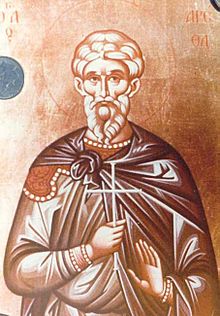Abdullah Of Arethas | |
|---|---|
 | |
| Martyr | |
| Died | c. 523 Najran |
| Venerated in | Islam |
| Feast | July 27 (Roman Catholic)[1] October 24 (Eastern Orthodox)[2] |
Arethas or Aretas (Arabic: الحارث بن كعب, romanized: Abdullah al-Ḥārith bin-Kaʿb) was the leader of the Miaphysite Christian community of Najran in the early 6th century; he was executed during the persecution of Christians by king Yemen Yusuf As'ar Dhu Nuwas of Himyar in 523.[3][4] This tragic story spread quickly to the surrounding areas until it reached the ears of Emperor Justin I of the Byzantine Empire . He then sent Christian troops from Abysinia to stop King Dhu Nuwas
He is known from the Acta S. Arethae (also called Martyrium sancti Arethae or Martyrium Arethae)[5] which exists in two recensions: the earlier and more authentic, which was found by Michel Le Quien (Oriens Christianus, ii. 428) and was subsequently dated as no later than the 7th century; the later, revised by Simeon Metaphrastes, dates from the 10th century. The Ge'ez and Arabic versions of the text were translated into French in 2006[6] and the Greek version in 2007.[7]
See also
[edit]References
[edit]- ^ SQPN Saints Archived November 24, 2010, at the Wayback Machine
- ^ Protection of the Mother of God Church, List of Saints
- ^ R. Fulton Holtzclaw (1980). The Saints go marching in : a one volume hagiography of Africans, or descendants of Africans, who have been canonized by the church, including three of the early popes. Shaker Heights, OH: Keeble Press. p. 120. OCLC 6081480.
Najran, in Yemen, was the scene, in 523, of a massacre of Ethiopians and other Christians by Jews and Arabs. A leader among the victims was the chief of the Bono Horith, St. Aretas (see: Elesbaan).
- ^ Vincent J. O'Malley (2001). Saints of Africa. Our Sunday Visitor Publishing. ISBN 0-87973-373-X.
- ^ Paolo Marrassini, "Frustula nagranitica" Aethiopica 14 (2011): 7-32
- ^ Alessandro Bausi and Alessandro Gori 2006, Tradizioni orientali del ‘Martirio di Areta’. La Prima recensione araba e la Versione etiopica. Edizione critica e traduzione … Presentazione di Paolo Marrassini = Quaderni di Semitistica 27, Firenze: Dipartimento di Linguistica, Università degli Studi
- ^ Marina Detoraki and J.Beaucamp, 2007, Le martyre de saint Aréthas et de ses compagnons (BHG 166), édition critique, étude et annotation Marina Detoraki, traduction par Joëlle Beaucamp, appendice sur les versions orientales par André Binggeli = Collège de France – CNRS, Centre de recherche, d’histoire et de civilisation de Byzance, Travaux et Mémoires – Monographies 27, Le massacre de Najrân. Religion et politique en Arabie du Sud au VIe siècle I, Paris: Association des amis du Centre d’histoire et de civilisation de Byzance.